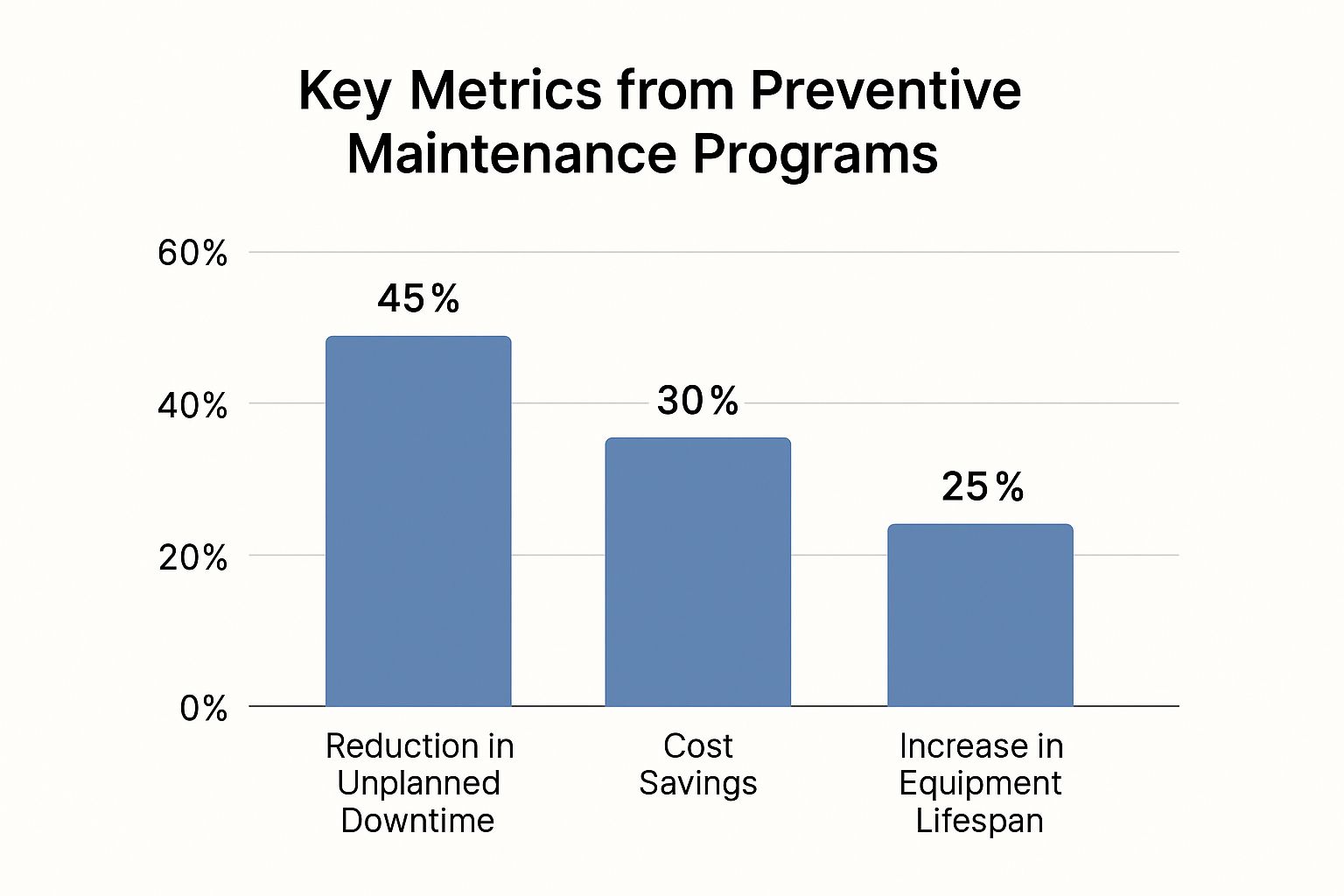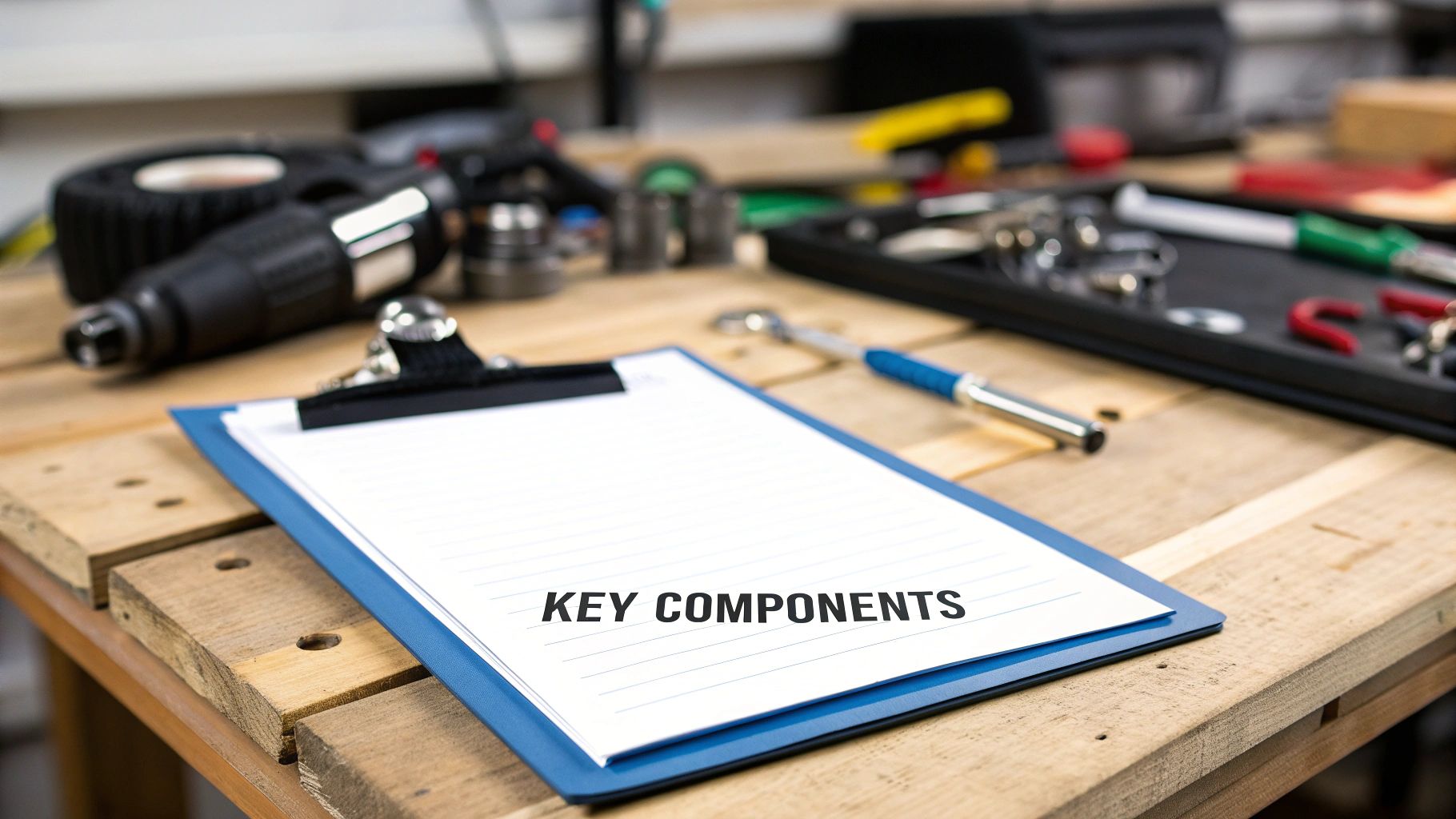Preventive Maintenance Programs: Protect Your Vehicle & Save Money
- coledem
- Jul 15, 2025
- 13 min read
A preventive maintenance program is a health and wellness plan for your car. Instead of waiting for a flashing warning light or a strange noise from under the bonnet, this approach focuses on regular, scheduled servicing. It is all about catching small issues before they snowball into expensive, trip-ruining breakdowns.
The Foundation of a Healthy Car
When it comes to looking after your vehicle, you have two choices: react to problems as they happen, or actively work to prevent them. Most people, often without realising it, fall into the reactive camp. That means a trip to the garage only happens when something has already gone wrong—the engine won’t start, the brakes are grinding, or a tyre gives up mid-journey. This approach almost always leads to stress, unexpected bills, and major inconvenience.
A preventive maintenance program flips that script entirely. It is built around a simple schedule of routine checks, fluid top-ups, and part inspections based on your car's mileage and age. This systematic care is designed to keep your car running smoothly and safely, dealing with normal wear and tear long before it can cause a failure on the road.
Proactive Care vs. Reactive Repair
At its heart, the difference comes down to foresight. One approach is about being in control and prepared for the future; the other is about damage control after the fact. The path you choose has a direct impact on your car's longevity, its safety on the road, and your bank balance.
The financial fallout from simply waiting for things to break can be huge. Unplanned downtime is expected to cost the UK and EU economies a staggering £80 billion in 2025. For the UK’s automotive sector alone, that translates to potential losses of up to £12 billion. While these are big-picture numbers, they highlight a simple truth: scheduled maintenance is critical for keeping things moving. You can explore the full report on the true cost of neglect for a deeper look.
To make the distinction clearer, let’s compare the two approaches side-by-side.
Preventive Care vs. Reactive Repair at a Glance
Aspect | Preventive Maintenance | Reactive Maintenance (Breakdown Repair) |
|---|---|---|
Timing | Scheduled in advance at your convenience | Unexpected, often at the worst possible time |
Cost | Smaller, predictable, and budgeted for | Larger, unplanned, and often includes towing fees |
Stress Level | Low - it is a routine appointment | High - involves a breakdown and uncertainty |
Vehicle Lifespan | Maximised by catching issues early | Often shortened because of severe part failure |
Safety | Improved by making sure components are in good working order | Compromised by driving with undiscovered faults |
As you can see, a little planning goes a very long way.
Visualising the Benefits
It is one thing to talk about the advantages, but seeing the data really drives the point home. The benefits of sticking to a maintenance schedule are clear, measurable, and significant.

This chart makes it plain: a commitment to regular upkeep pays you back by reducing downtime, lowering overall costs, and helping your car last longer. A formal program simply takes these common-sense steps and organises them into a routine that works for you and your vehicle.
Real-World Benefits of Regular Car Maintenance

It is one thing to know what a preventive maintenance programme is, but it’s another thing entirely to see how it genuinely pays off. When you commit to a regular care schedule for your car, the rewards are surprisingly significant, affecting everything from your safety to your bank balance. Think of it less as a chore and more as a smart investment in your vehicle’s health and your own peace of mind.
The advantages really boil down to three main areas: better safety on the road, serious long-term cost savings, and protecting your car's resale value. Each of these has a direct impact on you as a driver in Bedfordshire, showing how small, consistent efforts can lead to big wins.
Improved Safety for You and Your Passengers
At the end of the day, you need your car to stop, steer, and perform without a second thought. A proper maintenance plan focuses on the exact parts that keep you safe. Take your brakes, for instance. Routine inspections can spot worn pads or low fluid levels long before you find yourself in a heart-stopping situation on a busy roundabout.
It is the same story with your tyres. Keeping an eye on the pressure, tread depth, and alignment drastically cuts the risk of a dangerous blowout on the motorway. These proactive checks give you the confidence that your car will react precisely when you need it to, protecting you, your passengers, and everyone else on the road.
Substantial Long-Term Cost Savings
It might sound strange, but spending a little money regularly can save you a fortune down the line. A preventive maintenance schedule is your best defence against the massive repair bills that come from major, unexpected failures. A simple oil change is a perfect example.
Neglecting this basic task can cause severe engine damage, leading to a repair bill that could easily run into thousands of pounds. That is a world away from the small cost of regular oil changes. Studies actually show that this forward-thinking approach can cut overall maintenance costs by 12% and extend a vehicle's life by 20%.
This logic holds true for everything from gearbox fluid to timing belts. You can look deeper into these advantages in our guide to annual car servicing benefits.
Protecting Your Car’s Resale Value
When it’s time to sell or part-exchange your car, a full service history is your golden ticket. A meticulously kept record of regular maintenance is proof to any potential buyer that the car has been genuinely cared for.
This paper trail shows you’ve been a responsible owner, which immediately builds trust and justifies a higher asking price. A car with a spotty or missing service history will almost always fetch a lower price because buyers will (rightly) assume there could be hidden problems. A little bit of care now makes a huge difference to your car's value later.
Key Parts of a Successful Maintenance Programme

A really effective maintenance programme isn’t about one big, heroic fix. It is the small, consistent checks and services that work together to keep your car running smoothly. Think of it less as a single event and more like a health MOT for your vehicle, where each part contributes to its overall safety, reliability, and performance.
When you understand what these key services involve, you are better equipped to chat with your mechanic and truly appreciate the value of what’s being done under the bonnet.
Engine Oil and Filter Changes
Your engine is the heart of your car, and clean oil is its lifeblood. Oil does more than just lubricate; it cools moving parts, minimises friction, and cleans the engine by carrying away tiny particles of dirt and debris. But oil does not last forever. It eventually breaks down and becomes saturated with contaminants, making it far less effective.
That is why regular oil and filter changes are the cornerstone of any good maintenance plan. Skip them, and you are forcing your engine to work harder than it should, risking overheating, excessive wear, and a very expensive failure. The filter is just as important—it’s the gatekeeper that stops sludge from circulating where it should not.
Tyre Checks and Rotation
Your tyres are your car's only point of contact with the road, so their condition is absolutely critical for your safety. A proper tyre check is not just a quick glance; it involves a few key steps:
Pressure Inspection: Having the right tyre pressure is crucial for safe handling, good fuel economy, and even how quickly you can stop.
Tread Depth Measurement: Your tyre tread is designed to grip the road, especially when it is wet. While the legal minimum in the UK is 1.6mm, your car's performance and safety can start to suffer long before you hit that limit.
Rotation: By moving your tyres to different positions on the vehicle, we can make sure they wear down evenly. This simple step can significantly extend their life, saving you a fair bit of money in the long run.
If you want a more detailed look at what to check, our guide on creating a vehicle maintenance checklist for 2025 is a great place to start.
Brake System Inspections
When it comes to your car, the ability to stop safely is completely non-negotiable. A brake inspection is a detailed examination of every component, from the brake pads and discs to the callipers and fluid.
Our mechanics are trained to spot the early signs of wear, like thinning pads or scoring on the discs. We also check carefully for any fluid leaks, which can be incredibly dangerous and lead to a total loss of braking power. Catching these problems early is what keeps you safe on the road.
Even with the best of intentions, many organisations struggle to be proactive. A 2025 report revealed that while 71% of UK organisations say preventive maintenance is part of their strategy, less than 35% of their teams actually spend most of their time on it. This shows a big gap between knowing what is right and doing it.
Fluid Level Monitoring
Your car relies on a whole cocktail of different fluids to operate correctly. If any of them are running low, it could be a sign of a leak or another underlying issue that needs attention. A good maintenance plan always includes checking these key levels:
Coolant: This is what stops your engine from overheating.
Transmission Fluid: Keeps your gearbox lubricated for smooth gear changes.
Brake Fluid: Transfers the force from your foot on the pedal to the brakes themselves.
Power Steering Fluid: The magic juice that makes turning the wheel so easy.
Windscreen Washer Fluid: It might seem basic, but clear visibility is a fundamental safety feature.
Each fluid has a specific job, and keeping them topped up is a simple but powerful way to prevent complex mechanical headaches down the line.
Creating a Maintenance Schedule That Works for You

When it comes to looking after your car, there really is no magic, one-size-fits-all schedule. A truly effective maintenance plan is one that’s built around your specific car and, just as important, your life. The goal is to create a routine that actually works for you, putting you firmly in control of your vehicle's health and reliability.
So, where do you start? The best first step is to grab your vehicle’s owner’s manual. Think of it as the official rulebook written by the people who designed and built your car. It details all the crucial service intervals, from simple oil changes to major timing belt replacements, and forms the bedrock of any sensible maintenance plan.
Of course, the manual gives you the baseline. To really get it right, you need to factor in your personal driving habits and local conditions. Getting familiar with a comprehensive car maintenance checklist can be a fantastic way to see the bigger picture and start building a more proactive approach.
Adjusting for Your Driving Style
How you drive day-to-day has a massive impact on your car's components. Someone who primarily does short, stop-start runs around town is putting a very different kind of strain on their vehicle compared to a driver who cruises up and down the motorway.
It is worth thinking about your own patterns:
City Driving: All that stopping and starting is tough on your brakes. It also means your engine might not always reach its ideal operating temperature, which can lead to more wear. If this sounds like you, your car will likely benefit from servicing more often than the standard mileage suggests.
Motorway Driving: Long, steady drives are generally easier on the engine and brakes. You’ll probably see faster tyre wear and collect more stone chips on your paintwork and windscreen.
Working out how often to service a car based on these habits is crucial. Our 2025 guide for UK drivers goes deeper into this very topic.
Local Bedfordshire Conditions
Where you live and drive makes a difference, too. The unique mix of roads here in Bedfordshire—from town centres to winding rural lanes and fast A-roads—means your car is constantly adapting to different surfaces and traffic flows.
Your vehicle's age is another critical factor. A newer car might only need the basics, but an older vehicle benefits from more frequent inspections of its suspension, hoses, and electrical systems, which can degrade over time.
By blending the manufacturer’s advice with a realistic assessment of your driving routine and your car’s age, you can create a schedule that’s perfectly tailored. This is not about creating work; it is about being smart, staying ahead of problems, and making sure your car is ready and reliable for every single journey.
Common Myths About Preventive Car Maintenance
There is a lot of dodgy advice out there when it comes to looking after your car. Misinformation often gets in the way of proper care, with many drivers putting off or skipping regular servicing because of old myths that sound plausible but end up costing them a fortune. Let's clear the air and tackle some of the biggest ones.
The most common one we hear is, "If it is not broken, do not fix it." Honestly, this is a risky gamble. By the time you hear a strange noise or see a warning light pop up on the dash, the damage is already done. What could have been a simple, planned fix has now likely become a much bigger, more expensive, and far more inconvenient repair.
Preventive maintenance is all about getting ahead of the problem. It means servicing or replacing parts based on their expected lifespan, not waiting for them to fail spectacularly. Think of it as the difference between a planned, affordable timing belt change and a catastrophic engine failure on the M1.
"New Cars Do not Need Much Attention"
It is easy to assume that a brand-new car, with all its modern technology, can be left to its own devices for the first few years. While it is true that new vehicles are more reliable than ever, they are also incredibly complex machines.
Sticking to the manufacturer’s service schedule is non-negotiable if you want to keep your warranty valid. These early services are designed to address initial wear and tear, top up fluids, and confirm that all the sophisticated electronics are working as they should. Skip them, and you could invalidate your warranty and pave the way for major headaches down the road. For a deeper look, check out our article on why regular car service matters.
A more proactive, data-led approach to maintenance is gaining serious traction. Even outside the automotive world, the UK's 'Invest 2035' industrial strategy is championing digital tech in manufacturing. While only 20% of UK businesses had fully adopted digital-led maintenance in 2023, the direction of travel is undeniable. You can read more about these advancements in operational maintenance to see how things are changing.
"All Garages Are the Same"
There is the dangerous idea that any garage will do, so you might as well go for the cheapest quote. This could not be further from the truth. The quality of a service hinges entirely on the skill of the technician, the quality of their diagnostic equipment, and the standard of the parts they use.
A good, reputable garage invests heavily in ongoing training and state-of-the-art tools to service today’s vehicles correctly. Choosing a garage that only competes on price often means you are getting less experienced technicians using cheaper, lower-quality parts that are more likely to fail prematurely. Effective preventive maintenance programs are built on expertise you can trust, not just a bargain-basement price.
Finding the Right Car Care Partner in Bedfordshire
It’s one thing to read about preventive maintenance, but it is another thing entirely to find a local garage you can genuinely trust to look after your vehicle. For drivers all over Bedfordshire, the real challenge is finding a team that sees your car as more than just another job on the list—you need someone who’s truly invested in its long-term health and your safety. That’s exactly the philosophy we have built at Krause Autos.
We believe a truly effective maintenance plan always begins with a conversation. We do not rely on generic, one-size-fits-all schedules. Instead, we build a plan that’s right for your car, considering its specific age, mileage, and, crucially, your driving habits. After all, a car that handles the daily school run in Sandy has very different needs from one that’s regularly making the journey up the A1 to Bedford.
Our Promise to Bedfordshire Drivers
Our entire approach is grounded in a few simple, powerful principles. We pair our highly experienced technicians with top-quality parts, making sure every job is done right the first time. Just as important, we believe in clear, honest communication. You will always know exactly what work your car needs and, more important, why it needs it.
At Krause Autos, our goal is not just to fix cars when they break down. We aim to be your long-term partner in vehicle care, focusing on smart, proactive maintenance that keeps you safe and saves you money down the road.
We are proud to serve communities across Bedfordshire, including Sandy, Bedford, and Biggleswade, offering a complete range of services from our single workshop. Whether it is a routine service, a tricky diagnostic puzzle, or even bodywork, our team has the skills to handle every aspect of your car's wellbeing. This gives you one reliable, trusted point of contact for everything your vehicle needs.
Choosing a garage is about more than just location or price; it’s about feeling confident. It’s the peace of mind that comes from knowing your car is in safe hands with a team dedicated to helping you get many more years of happy, trouble-free motoring.
Your Questions Answered
We get a lot of questions about preventive maintenance, so let's tackle some of the most common ones we hear from drivers.
How Often Should My Car Get Preventive Maintenance?
Your car’s owner’s manual is always the best place to start; it has the exact schedule the manufacturer recommends. If you can not find it, a good rule of thumb is to book a check-up at least once a year or every 10,000 miles.
Of course, this is not set in stone. Your personal driving habits play a big part. If you’re mostly doing short, stop-and-go runs around town, more frequent checks are a smart move. If your driving consists mainly of long, steady journeys on the motorway, you can probably stick closer to the mileage guidelines.
Is a Preventive Maintenance Programme Expensive?
It’s a fair question, but it helps to reframe how you think about the cost. A maintenance plan is made up of smaller, predictable payments that you can budget for, much like any other regular household bill.
The alternative is waiting for something to go wrong. A major breakdown often brings a massive, unexpected repair bill, not to mention the extra costs for towing and getting you back on the road. The small, consistent investment in proactive care almost always saves you a significant amount of money in the long run by preventing those huge, stressful expenses.
Can I Do Some Maintenance Tasks Myself?
Definitely! There are a few simple checks every car owner can—and should—do regularly. These small habits can make a huge difference in catching problems early:
Monitoring tyre pressure: A quick monthly check with a pressure gauge is all it takes to improve safety and fuel economy.
Checking fluid levels: It’s easy to pop the bonnet and check your engine oil, coolant, and windscreen washer fluid.
Inspecting lights: Walk around your car every so often and make sure all your headlights, brake lights, and indicators are working properly.
For anything more involved, like brake servicing, engine diagnostics, or jobs that need special equipment, it is always best to leave it to the professionals. That way, you know the job is done right, keeping both you and your vehicle safe.
Ready to create a maintenance plan that protects your car and your wallet? The team at Krause Autos is here to help drivers across Bedfordshire with expert advice and trusted servicing. Find out more about how we can help at Krause Autos.
Article created using [Outrank](https://outrank.so)





Comments